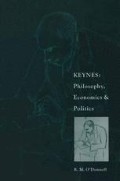Abstract
Given the growing interest of economists in the philosophy of science and the lack of consensus among economic schools, the epistemology deployed by Keynes in his economic writings is evidently relevant and topical. As early as 1937 Leontief thought that any ‘show-down between the Cambridge … and the orthodox type of theory … must be fought out on methodological grounds’ (1937 p. 337; 1966 p. 58), a view generalised by Blaug’s dictum (1980 p. xiii) that ‘every controversy in economics involves questions of economic methodology’. But compared to the stature accorded Keynes in theory and policy, it is remarkable how insignificant a role he is given in discussions of the philosophy and methodology of economics. The giant of one sphere is a virtual non-entity in the other. While the methodological views of his father (whose impact on theory and policy was negligible) have received considerable attention, those of the son have drawn only isolated comment despite his extensive philosophical background. The lacuna, fortunately, is remediable.2
… it is a matter of dogmatism on either side; but it was Burke who had the clearer intuition.
J.M. Keynes 1904
[The master-economist] must understand symbols and speak in words. He must contemplate the particular in terms of the general, and touch abstract and concrete in the same flight of thought.
J.M. Keynes 1924
So as to bring home the essential features to the reader’s intuition, let us construct a simplified model of an entrepreneur economy.
J.M. Keynes 1933
… in writing economics one is not writing either a mathematical proof or a legal document. One is trying to arouse and appeal to the reader’s intuitions …
J.M. Keynes 1935
… you seem to have persuaded yourself that you are dealing with the real world. This makes it all the more important to emphasise the assumptions you are making which distinguish your model from reality.
J.M. Keynes 19421
Access this chapter
Tax calculation will be finalised at checkout
Purchases are for personal use only
Preview
Unable to display preview. Download preview PDF.
Author information
Authors and Affiliations
Copyright information
© 1989 R. M. O’Donnell
About this chapter
Cite this chapter
O’Donnell, R.M. (1989). Epistemology and Economics. In: Keynes: Philosophy, Economics and Politics. Palgrave Macmillan, London. https://doi.org/10.1007/978-1-349-07027-5_11
Download citation
DOI: https://doi.org/10.1007/978-1-349-07027-5_11
Publisher Name: Palgrave Macmillan, London
Print ISBN: 978-1-349-07029-9
Online ISBN: 978-1-349-07027-5
eBook Packages: Palgrave Economics & Finance CollectionEconomics and Finance (R0)

